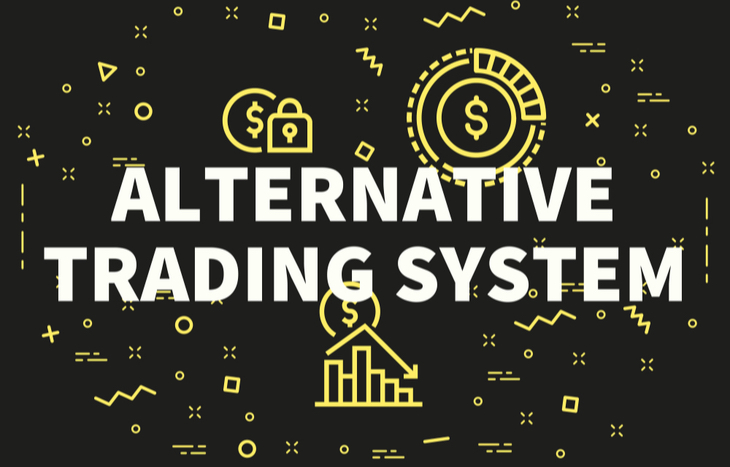What Is an Alternative Trading System?
While most retail investors place trades through a brokerage, it’s not the only way to buy and sell securities. There are also alternative trading systems, largely used by institutional investors.
What is an alternative trading system (ATS)? While it functions similarly to an exchange, an ATS offers a more direct way to trade large chunks of securities in a way that doesn’t influence the share price during market hours. Moreover, there are fewer rules to abide by, giving institutional investors more opportunities to trade.
While most retail investors won’t participate in an ATS, it’s still important to know how they function. These systems can explain a lot of the behind-the-scenes activities that occur after hours, off-market and through private deals.

Non-Exchange Trading Venues
An alternative trading system– called a multilateral trading facility in Europe – is a type of non-exchange trading venue. It matches buyers with sellers, instead of facilitating trades through an exchange float pool.
There are several benefits to this direct buyer-to-seller match. There are few to no fees associated with alternative trading systems, and they offer a marketplace with fewer restrictions and rules. In fact, there are almost no restrictions on trading. As a result, there’s significant liquidity, since traders can move large blocks at a low cost with no barriers to how those shares change hands. Due to their less restrictive nature, these non-exchange venues typically attract significant activity from institutional investors, especially after hours. These transactions aren’t recorded on public books.
While ATS trading is open to retail traders, most run-of-the-mill investors will find it easier to use an exchange.
How Are Alternative Trading Systems Regulated?
While they might sound like a free-for-all, ATS platforms do come with regulations. First, they’re subject to approval by the Securities and Exchange Commission (SEC). Most register as broker-dealers and are regulated as such.
Once approved by the SEC to facilitate buying and selling, ATS platforms face further regulation through the Financial Industry Regulatory Authority (FINRA). FINRA publishes trading information on a delayed basis for each ATS. This helps bring a sense of transparency to non-exchange trading venues.
ATS platforms have a strong incentive to maintain compliance with the SEC: Investigations have been on the rise for the past several years. Any abuse of confidential customer information or evidence of trades against customer order flow can result in fines or shut-downs by the SEC.
Types of Alternative Trading Systems
The term “alternative trading system” is actually an umbrella term. It includes several types, each serving a different purpose. Here’s a look at the most common ones:
- ECNs. Electronic communication networks (ECNs) are the most prevalent ATS platforms. They generally operate in a basic broker-dealer capacity, pairing buyers and sellers directly.
- Call markets. Instead of trading as soon as the buyer and seller agree on a price, call markets execute at a predetermined price equilibrium. Any trades placed before that equilibrium execute as part of the trade at a predetermined time.
- Dark pools. These are where block trades occur. They’re among the largest ATS networks, but they also have the least amount of transparency. Mutual funds, pension funds and hedge funds tend to trade off-market and after hours in dark pools.
- Crossing networks. Crossing networks are similar to dark pools in that they’re designed to create liquidity for large block trading. There’s virtually total anonymity, including between buyers and sellers.
Alternative trading systems range in transparency and availability. However, a significant volume of daily trades occurs off-exchange with very little visibility to exchange-focused investors.
The Benefits of an ATS
The biggest benefit of ATS platforms – and the reason they exist – is to preserve liquidity. Large block trades happen via ATS instead of on-market, where they might skew price and sentiment drastically. Through dark pools and similar off-market trades, institutions can rebalance and update positions without fear of skewing the market.
The other chief benefit of an ATS is that it’s a broker-dealer system, which means there are fewer obstacles to trading. Institutional investors looking to avoid exchange fees and restrictions won’t find them on an ATS. This also contributes to better liquidity.
The Drawbacks of an ATS
There’s a lot of criticism from retail investors when it comes to ATS trades – specifically dark pools. Because these trades aren’t recorded, it’s often unclear how and where shares are traded. Many investors see this as a disadvantage that puts them at the mercy of shadowy market movements they can’t predict and don’t understand.
Another drawback to alternative trading systems can be the lack of restrictions.
For example, front-running – the practice of buying shares out from under an investor, only to turn around and sell them back at a premium – is banned on most exchanges. Unfortunately, front-running can happen in dark pools with little to no repercussion.
Should You Use an Alternative Trading System?
If you’re a retail investor, there are very few times, if any, when you’ll actually use an alternative trading system. These systems focus on providing liquidity for large-chunk buying and selling – usually for hedge funds and other institutional investors. And while it might seem unfair that retail investors are largely relegated to exchanges, ATS platforms actually benefit retail investors indirectly. Limiting large swings in share price every time institutions buy or sell keeps market volatility much lower than it would otherwise be.
These terms, systems and trading strategies can be overwhelming without further explanation and research. That’s why you should sign up for the Investment U e-letter by clicking the blue “Subscribe” button above. Our daily newsletter will give you the latest investment insights, knowledge and more!
Retail investors should stick to exchanges to buy and sell securities. That said, they should also know what’s happening in dark pools and other ATS broker-dealer situations, to understand who’s interacting with certain companies and what those movements mean.





